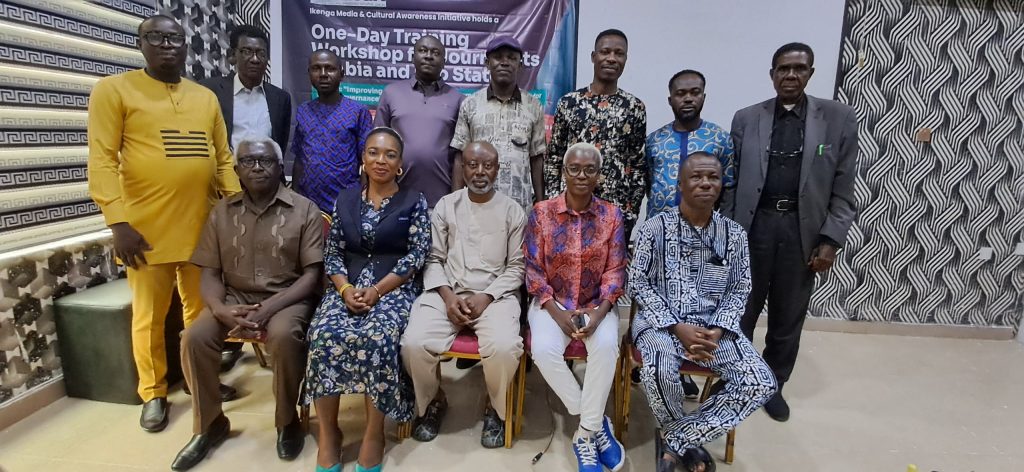Stephen Ukandu, Umuahia
Ikenga Media & Cultural Awareness Initiative (IMCAI), the publishers of Ikengaonline newspapers, has organised a one-day training for journalists in Umuahia, Abia State on improving quality of journalism in the South-East for good governance.
Speaking at the workshop, Co-Publisher of Ikengaonline, Dr Chido Onumah, said it was “one of the activities of IMCAI supported by the MacArthur Foundation through the Wole Soyinka Centre for Investigative Journalism, WSCIJ, to promote accountability and good governance through media independence and ethical journalism in our country.”
He said that the training which was in its third year was for journalists in the South-East, had recorded tremendous success.
According to him, no fewer than 55 journalists in Abia, Anambra, Ebonyi, Enugu and Imo States had been trained on fundamentals of investigative journalism, media and information literacy, and how to report from a treacherous environment.
“Some of the feedbacks we got after previous trainings include the need for continued reinforcement of the message of how the media can impact positively on the governance process,” he added.
He noted with concern, some information gap and unethical behaviours in the practice of journalism in the South-East, explaining that Ikengaonline was established to help bridge the gap.
“As an organisation, Ikenga Media & Cultural Awareness Initiative has through its flagship activity, the publication of Ikengaonline, been trying its best to bridge the information gap and promote responsible and development journalism in the South-East media ecosystem.
“This became necessary following the apparent lack of adequate reportage, misinformation and outright disinformation on issues concerning the South-East zone.
“In essence, Ikengaonline, which is intentionally focused on the South-East is a bold attempt to give the people of the zone a voice in the media, which has been brazenly lacking in the past.”
Dr Onumah regretted that since the return of Nigeria to civil rule in 1999, the South-East geopolitical zone, “has been identified as perhaps one of the worst governed zones in terms of the people receiving what is regarded as democratic dividends.”
He said: “Our elections have been one of the poorest in terms of integrity of the votes and safety of voters. Civil and personal liberties have often been trampled upon and basic infrastructures lacking.
“When you add the ravaging insecurity in the South-East, what you get is a picture of a democracy in peril.
“It is worth asking then whether the media in the South-East is complicit in the poor quality of governance? What is the quality of the media in the region? Has the media abdicated its watchdog role assigned to it in Section (22) of the Nigerian Constitution 1999 (as amended)? What can be done to improve the quality of journalism practice in the South-East? Finding answers to the above questions are the objective of this workshop.”
Speaking on “Ethical Journalism in an Era of Technology,” one of the resources persons and former Secretary to State Government (SSG), Abia State, Elder Ralph Egbu, regretted the abuse in the recruitment of Journalists which had unfortunately become ” all commers affairs.”
The former Commissioner for Information who was represented by a veteran journalist and retired Permanent Secretary, Sir Chimdi Oluoha, attributed the non-compliance with ethical behaviours among media practitioners to the invasion of journalism profession by persons without training and the prerequisite qualifications.
Elder Egbu who noted that “Governments and journalists are not usually on the same page,” urged journalists to strive to live up to their constitutional responsibility of holding government accountable to society without comprising ethics.
While regretting that media professionals in the South-East do not enjoy privileges their colleagues in other zones enjoy, he charged journalists not to compromise ethics because of percuniary interests.
The former SSG further said: “Journalism is an endangered craft. it’s being buffeted from many angles. The situation is worse in the South-East. Media professionals in Ala Igbo do not enjoy some privileges as professionals in other regions especially the South-West.
“The South-East does not boast of the support and succour provided by media-focused non-governmental organisations…
“There is also a dearth of government -owned traditional media organisations in the South-East and this constrains the blossoming of the profession in our part of the country.
“Internet and digital penetration in Ala Igbo is still not deep. That may explain why there are not many significant blogs and citizen journalists in our homestead. A stunted media whether traditional or new media will not be able to play its role in effectively serving the South-East states and holding governments accountable.”
Another resource person, Chinagorom Ugwu of Premium Times, who spoke on “Moving the Needle: The kind of Journalism that Engenders Good Governance,” shared his experiences in the field.
The award-winning Investigative Reporter, urged participants to go beyond the ordinary informative reportage, and do indepth analysis and investigation of matters which Government and newsmakers often do not want reported.
He, however, cautioned that investigative reports must be of public interest and not aimed at settling scores with people involved.
Mr Ugwu submitted that investigative journalism “is the only kind of journalism that will engender good governance, help curb corrupt practices, and strengthen democracy.”
He, however, identified challenges of funding, poor motivation, the ideology of the news organisation, lack of adequate training, and conflict of interests as some of the reasons journalists shy away from investigative journalism.
Some of the participants, Ogbonnaya Ikokwu of The PUNCH Newspapers; Chinwe Ugele of News Central Television; Chukwuma Emele of the Broadcasting Corporation of Abia, BCA, thanked the Management of Ikengaonline for the enriching workshop, and wished it be organised more regularly.

